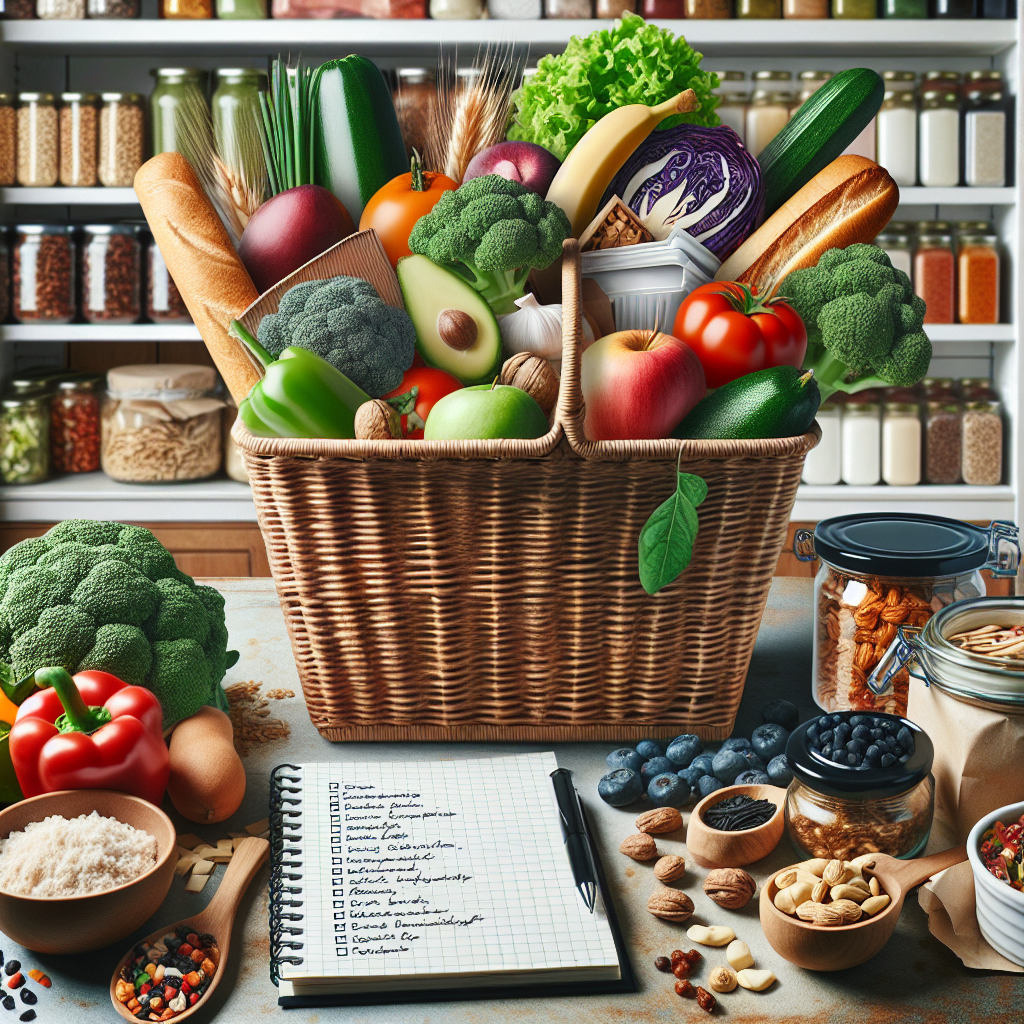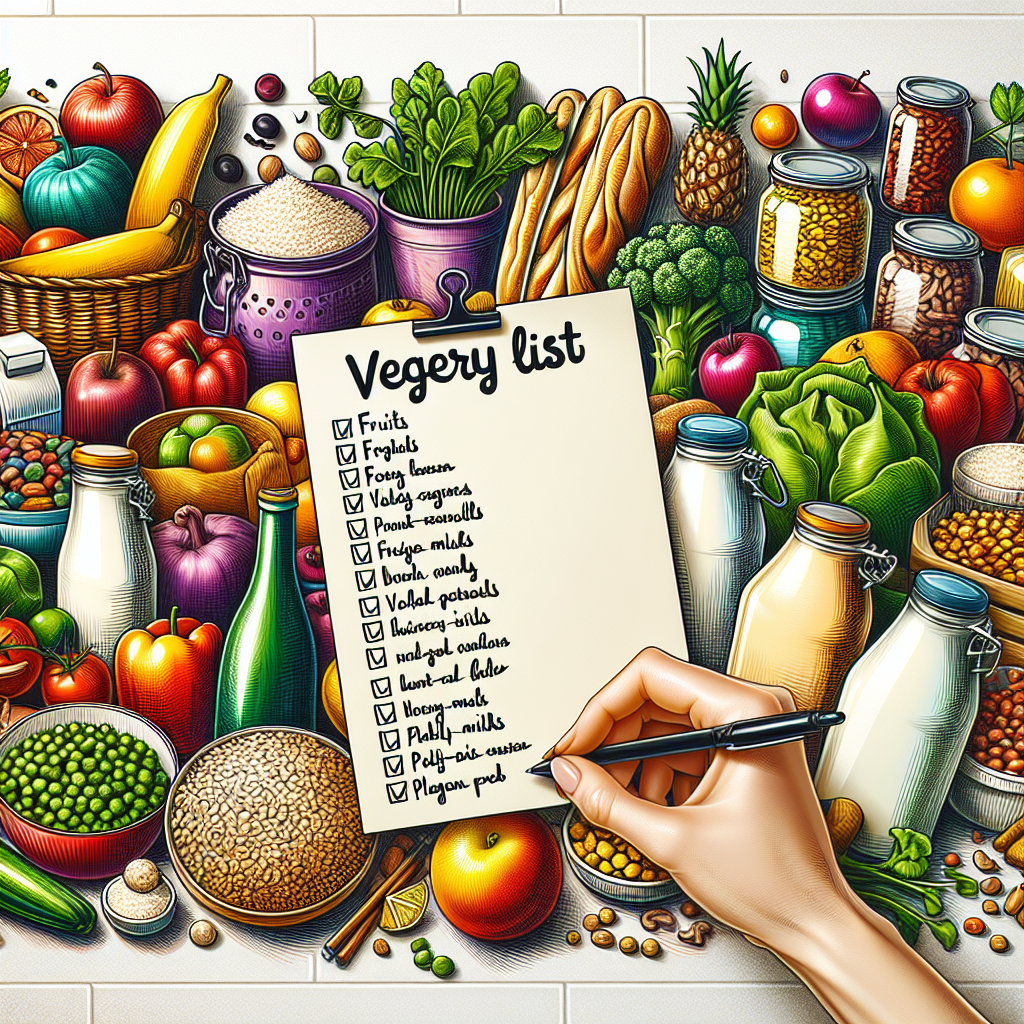Vegan Grocery List: Introduction
Looking to overhaul your pantry with vegan-friendly options? Look no further than our comprehensive Vegan Grocery List. Packed with delicious plant-based alternatives, this list covers all the essentials you’ll need to create flavorful and nutritious meals.
From fresh produce to pantry staples and even vegan snacks, we’ve got you covered. Whether you’re a seasoned vegan or simply curious about incorporating more plant-based options into your diet, our Vegan Grocery List is here to make your shopping experience a breeze. Get ready to explore a world of vibrant flavors and discover a whole new way of eating.

Fruits and Vegetables
Fresh Fruits
Fresh fruits are a vital part of any healthy diet, and as vegans, they offer us a wide variety of delicious options. From juicy oranges and ripe strawberries to crisp apples and sweet pineapples, there is something for everyone to enjoy. Fruits are not only packed with essential vitamins and minerals, but they also provide natural sugars that fuel our bodies and satisfy our sweet cravings. So, next time you’re at the grocery store, be sure to grab a selection of fresh fruits to add a burst of flavor and nutrition to your meals and snacks.
Fresh Vegetables
Eating a variety of fresh vegetables is key to maintaining a balanced and nutritious vegan diet. Luckily, the options are endless when it comes to incorporating vegetables into our meals. Whether you prefer leafy greens like spinach and kale, crunchy bell peppers, or versatile veggies like zucchini and carrots, there is no shortage of choices. Fresh vegetables not only provide essential vitamins, minerals, and dietary fiber, but they also add color, texture, and flavor to our dishes. So, make sure to load up your shopping cart with an array of fresh vegetables to keep your meals exciting and nutritious.
Frozen Fruits and Vegetables
Frozen fruits and vegetables are a convenient and cost-effective way to ensure we always have access to nutritious options, even when fresh produce may not be readily available. These frozen gems are picked at their peak ripeness and then immediately frozen, preserving their taste and nutritional value. From broccoli and peas to mixed berries and mango chunks, frozen fruits and vegetables offer a convenient solution for smoothies, stir-fries, and other recipes. Stocking up on frozen options ensures that we can always add a healthy dose of fruits and vegetables to our meals, no matter the season.
Canned Fruits and Vegetables
While fresh and frozen options are often preferred, canned fruits and vegetables can be a convenient alternative when fresh produce might not be accessible. Canned fruits like peaches, pineapple, and mandarin oranges can be enjoyed on their own or used in various recipes like fruit salads or desserts. Canned vegetables like corn, peas, and green beans can be easily added to soups, stews, or even enjoyed as a side dish. When choosing canned options, it’s essential to look for those packed in water or natural juices rather than heavy syrups or sauces. Canned fruits and vegetables are a pantry staple that can come in handy when we need a quick and nutritious addition to our meals.
Whole Grains
Quinoa
Quinoa is a versatile and nutrient-dense whole grain that should be a staple in every vegan pantry. Packed with protein, fiber, and essential vitamins and minerals, quinoa is a complete plant-based protein source. Its nutty flavor and fluffy texture make it a perfect base for salads, stir-fries, and grain bowls. Quinoa is also naturally gluten-free, making it a fantastic option for those with dietary restrictions. So, next time you’re looking to diversify your grains, don’t forget to add quinoa to your shopping list.
Brown Rice
Brown rice is a nutritious whole grain that is an excellent source of complex carbohydrates and essential minerals like magnesium and phosphorus. Unlike white rice, brown rice retains its bran and germ layers, making it a more nutrient-dense option. It also provides dietary fiber, which aids in digestion and helps keep us feeling satisfied. Whether used in sushi, stir-fries, or as a side dish, brown rice is a versatile and hearty addition to any vegan meal.
Oats
Oats are a breakfast staple for many vegans, and for a good reason. They are a great source of dietary fiber, protein, and essential nutrients like manganese and phosphorus. Not only are oats incredibly versatile, but they also provide a feeling of fullness that can help prevent overeating later in the day. Whether enjoyed as overnight oats, in homemade granola, or as a topping for smoothie bowls, oats offer a delicious and nutritious start to the day.
Whole Wheat Pasta
When it comes to pasta, whole wheat options are the way to go. Whole wheat pasta retains the bran and germ layers of the grain, making it higher in fiber and nutrients compared to refined white pasta. It provides complex carbohydrates for sustained energy and can be enjoyed in a variety of dishes, from classic spaghetti to hearty lasagna. So, next time you’re craving a comforting pasta dish, opt for whole wheat pasta to add more nutritional value to your meal.
Legumes
Lentils
Lentils are a plant-based powerhouse when it comes to protein and dietary fiber. They are an excellent source of essential minerals like iron, potassium, and folate. What makes lentils even more appealing is their versatility and quick cooking time. From lentil soups and stews to lentil-based curries and salads, the possibilities are endless. Lentils also come in various colors, including green, brown, and red, each with its own unique flavor and texture. By incorporating lentils into our meals, we can enjoy their nutritional benefits while adding depth and heartiness to our vegan dishes.
Chickpeas
Chickpeas, also known as garbanzo beans, are a beloved legume in the vegan community. They are a great source of plant-based protein, dietary fiber, and essential minerals like manganese and folate. Chickpeas can be cooked, roasted, or mashed, making them incredibly versatile in a wide range of recipes. Whether used to make hummus, added to salads, or even transformed into delicious falafels, chickpeas offer a fantastic texture and flavor that can elevate any vegan dish.
Black Beans
Black beans are a staple in many Latin American and Caribbean cuisines, and for good reason. They are packed with protein, dietary fiber, and essential minerals like iron and potassium. Black beans have a rich, earthy flavor and a creamy texture that works well in dishes like black bean soups, rice and bean bowls, or even veggie burgers. Whether canned or dried, black beans are a fantastic addition to our vegan pantry.
Kidney Beans
Kidney beans are another legume that deserves a spot in our vegan pantry. They are a great source of plant-based protein, dietary fiber, and essential vitamins and minerals like folate and iron. Kidney beans are known for their deep red color and kidney-shaped appearance. In addition to their nutritional benefits, they add a hearty texture and a slightly sweet flavor to dishes like chili, salads, or even bean dips. So, don’t forget to stock up on kidney beans for a delicious and nutritious addition to your vegan meals.
Nuts and Seeds
Almonds
Almonds are a fantastic source of healthy fats, protein, and essential nutrients like vitamin E and magnesium. They can be enjoyed on their own as a quick and satisfying snack, or used in a variety of recipes from almond milk and almond butter to nutty granola and energy balls. Almonds can be toasted, ground, or chopped, adding a wonderful crunch and flavor to both savory and sweet dishes. So, make sure to include almonds in your shopping list to incorporate some nutritious crunch into your vegan meals.
Walnuts
Walnuts are not only delicious but also incredibly nutritious. They are an excellent source of omega-3 fatty acids, which are beneficial for heart health. Walnuts are also rich in antioxidants, protein, and essential vitamins and minerals. They can be enjoyed on their own or used in various recipes like salads, oatmeal, and baked goods. Adding walnuts to your vegan pantry will provide a satisfying crunch and a nutritional boost to your meals.
Chia Seeds
Chia seeds have gained popularity in recent years due to their impressive nutritional profile. These tiny black seeds are packed with fiber, protein, omega-3 fatty acids, and essential minerals like calcium and magnesium. Chia seeds are incredibly versatile, as they can be mixed with water to create a gel-like consistency to replace eggs in baking or used as a topping for puddings, smoothies, or oatmeal. They also add a fun texture and a nutritional punch to any dish they are added to, making them a must-have in any vegan pantry.
Flaxseeds
Flaxseeds are another superfood that offers a wide array of health benefits. They are an excellent source of omega-3 fatty acids, dietary fiber, and essential vitamins and minerals. Flaxseeds can easily be ground into a fine powder, making it easier for our bodies to absorb their nutrients. They can be incorporated into baked goods, smoothies, or even used as an egg substitute in vegan recipes. Adding flaxseeds to your pantry will not only enhance the nutritional value of your meals but also add a nutty flavor and a fluffy texture to your dishes.

Plant-Based Protein
Tofu
Tofu is a staple in many vegan diets, and for good reason. It is a versatile and budget-friendly source of plant-based protein. Made from soybeans, tofu comes in various forms like silken, firm, and extra firm, each with its own unique texture and usage. Silken tofu is ideal for blending into dressings, sauces, or smoothies, while firmer varieties are perfect for stir-fries, grilling, or baking. Tofu absorbs flavors well, making it a fantastic base for marinades and sauces. Including tofu in your shopping list will provide you with endless options for creating delicious and protein-packed vegan meals.
Tempeh
Tempeh is another soy-based product that offers a substantial amount of plant-based protein and a unique texture. It is made by fermenting cooked soybeans with a specific mold, resulting in a firm and nutty product. Tempeh is known for its versatility, as it can be grilled, sautéed, or baked, and marinated to absorb a variety of flavors. It is often used as a meat substitute in vegan recipes like burgers, tacos, or even as bacon alternatives. By adding tempeh to your vegan pantry, you can enjoy its protein-rich benefits while adding a hearty and satisfying element to your meals.
Seitan
Seitan, also known as wheat meat or wheat gluten, is a protein-packed meat substitute made from gluten, the primary protein in wheat. Although it may not be suitable for those with gluten sensitivities or allergies, seitan offers a chewy texture and a savory flavor that can mimic meat. It can be seasoned, marinated, and cooked in a variety of ways, allowing for endless culinary possibilities. From stir-fries and sandwiches to stews and roasts, seitan can be utilized to create hearty and satisfying vegan dishes. So, if gluten is not a concern for you, consider adding seitan to your shopping list to explore its meat-like qualities and protein content.
Plant-Based Protein Powders
Plant-based protein powders are a convenient way to supplement our vegan diet with an additional boost of protein. Made from various protein-rich sources like pea, rice, hemp, or soy, these powders can easily be added to smoothies, shakes, or even baked goods. They are a great option for athletes, those with increased protein needs, or anyone looking to increase their daily protein intake. While it’s always preferable to obtain nutrients from whole foods, plant-based protein powders can be a valuable addition to your vegan pantry for those times when convenience is key.
Dairy Alternatives
Almond Milk
Almond milk is a popular dairy alternative that provides a rich and creamy taste without the need for animal-based products. Made from ground almonds and water, almond milk is naturally lactose-free and can be a great option for those with lactose intolerance or dairy allergies. It is a versatile plant-based milk that can be used in both savory and sweet recipes, from smoothies and desserts to sauces and soups. Almond milk also offers a good amount of vitamin E and essential minerals like calcium and magnesium. So, add almond milk to your shopping list to enjoy its smooth texture and nutty flavor in your vegan creations.
Coconut Milk
Coconut milk is another excellent dairy alternative that adds a tropical twist to our vegan dishes. Made from the grated flesh of mature coconuts, coconut milk is rich and creamy, making it a perfect addition to curries, soups, and creamy desserts. It is high in healthy fats and provides essential minerals like manganese and copper. Coconut milk can also be enjoyed on its own as a refreshing beverage or used to make dairy-free yogurt and ice cream. So, don’t forget to grab a can or two of coconut milk to add a touch of richness and tropical flavor to your plant-based meals.
Soy Yogurt
Soy yogurt is a go-to choice for vegans looking for a dairy-free alternative to traditional yogurt. Made from soy milk and live bacterial cultures, soy yogurt offers a similar creamy texture and tangy flavor as its dairy counterpart. It is a great source of plant-based protein, dietary fiber, and essential vitamins and minerals. Soy yogurt makes for a delicious and satisfying snack on its own or can be used in recipes like smoothies, parfaits, or even as a substitute for sour cream. So, whether you’re looking to enjoy it straight from the container or get creative with your culinary creations, soy yogurt is a fantastic addition to your vegan grocery list.
Cashew Cheese
Cashew cheese is a popular dairy-free alternative that provides a creamy and savory taste similar to traditional cheese. Made from soaked cashews, nutritional yeast, and other flavorings, cashew cheese can be spread on crackers, used as a dip, or melted into pasta sauces. It offers a good amount of healthy fats and essential minerals like copper and magnesium. Cashew cheese is a versatile option that can add richness and depth of flavor to your vegan dishes. So, next time you’re looking to satisfy your cheese cravings, reach for some cashew cheese to elevate your plant-based meals.

Healthy Fats
Avocados
Avocados are a vegan’s best friend when it comes to incorporating healthy fats into our diet. They are rich in monounsaturated fats, which are heart-healthy and provide a feeling of satiety. Avocados are also packed with essential vitamins, minerals, and dietary fiber. Whether enjoyed on toast, in salads, or blended into smoothies, avocados add a creamy and buttery texture to our meals that is hard to resist. So, make sure to include avocados in your grocery list to enjoy their nutritional benefits and enhance the flavor and texture of your vegan creations.
Olive Oil
Olive oil is a staple in many kitchens and for a good reason. It is a monounsaturated fat that is known for its heart-healthy properties. Olive oil adds a delicious and rich flavor to our dishes, from salad dressings and sautés to roasted vegetables and pasta sauces. It can also be drizzled over grilled bread or used as a dip for fresh veggies. While it’s important to consume fats in moderation, incorporating olive oil into your cooking can provide numerous health benefits and enhance the taste and texture of your vegan meals.
Coconut Oil
Coconut oil has gained popularity in recent years due to its unique flavor and versatile uses. It is a plant-based fat that is solid at room temperature but melts easily when heated. Coconut oil adds a subtle tropical flavor and a rich texture to our cooking and baking. It can be used as a substitute for butter in recipes, added to smoothies or coffee for a creamy consistency, or even used for oil pulling to support oral health. While it is high in saturated fats, using coconut oil in moderation can be a flavorful and nutritious addition to your vegan pantry.
Peanut Butter
Peanut butter is a beloved and versatile spread made from ground peanuts. It is a fantastic source of healthy fats, plant-based protein, and essential minerals like magnesium and potassium. Whether smeared on toast, stirred into oatmeal, or used as an ingredient in baking, peanut butter adds a delightful nutty flavor and a creamy texture to our vegan creations. Opt for natural varieties without added oils or sugars to enjoy the full nutritional benefits of peanut butter. So, don’t forget to stock up on some peanut butter to indulge in a tasty and nutritious treat.
Herbs and Spices
Basil
Basil is an aromatic herb that adds freshness and complexity to our vegan dishes. Whether used in pesto, salads, soups, or even infused into oils and vinegars, basil lends a delightful aroma and a hint of sweetness to our recipes. It pairs well with various ingredients like tomatoes, garlic, and even fruits, making it a versatile herb to have on hand. In addition to its culinary uses, basil also offers potential health benefits, as it contains essential oils that have been shown to have anti-inflammatory and antioxidant properties. So, make sure to include basil in your herb collection to elevate your vegan creations and enhance their flavors.
Cumin
Cumin is a spice commonly used in various cuisines around the world. It has a warm and earthy flavor that adds depth and complexity to our vegan dishes. Cumin can be used in curry powders, spice blends, or sprinkled on roasted vegetables for a rich and savory taste. It is also known for its potential digestive benefits and antioxidant properties. So, next time you’re looking to enhance the flavor of your vegan dishes, reach for some cumin to add a touch of warmth and complexity.
Turmeric
Turmeric is a vibrant yellow spice that not only adds a beautiful color to our dishes but also offers numerous health benefits. It has a slightly bitter and peppery taste and is commonly used in curries, rice dishes, and even smoothies. Turmeric contains a compound called curcumin, which has powerful anti-inflammatory and antioxidant properties. Adding turmeric to our meals can not only elevate their flavor but also provide potential health benefits. So, consider including turmeric in your spice collection to add a burst of color and nutrition to your vegan creations.
Oregano
Oregano is a popular herb used in Mediterranean and Italian cuisines. It has a robust and aromatic flavor that pairs well with tomatoes, garlic, and various vegetables. Whether used in pasta sauces, pizza toppings, or sprinkled on roasted veggies, oregano adds a delightful and savory taste. It is also rich in antioxidants and potentially beneficial compounds. So, make sure to stock up on oregano to infuse your vegan dishes with its distinct flavor and potential health benefits.

Condiments and Sauces
Tamari Sauce
Tamari sauce is a type of soy sauce that is gluten-free and made with minimal ingredients. It provides a rich and savory flavor to our vegan dishes, making it a perfect addition to stir-fries, marinades, and sauces. Tamari sauce is known for its depth and complexity, making it a suitable substitute for traditional soy sauce. Whether you’re looking to add a burst of umami to your meals or create a delicious dipping sauce, tamari sauce is a must-have condiment in your vegan pantry.
Nutritional Yeast
Nutritional yeast, often referred to as “nooch,” is a versatile and flavorful ingredient commonly used in vegan cooking. It is a deactivated yeast that has a cheesy and nutty flavor, making it a fantastic dairy-free alternative for adding umami and depth to our dishes. Nutritional yeast is also packed with essential vitamins and minerals, including vitamin B12, making it a valuable addition to a vegan diet. Whether used as a topping for popcorn, sprinkled on pasta dishes, or mixed into sauces and dressings, nutritional yeast is a versatile condiment that brings a unique and delicious taste to our meals.
Hummus
Hummus is a beloved and versatile dip made from chickpeas, tahini, lemon juice, and spices. It offers a creamy and tangy flavor that pairs well with a wide variety of foods. Whether used as a dip for vegetables, spread on sandwiches or wraps, or even used as a base for dressings and sauces, hummus adds a delightful creaminess and a burst of flavor to our vegan creations. It is also a great source of plant-based protein, dietary fiber, and essential nutrients. So, don’t forget to include hummus in your grocery list to enjoy its deliciousness and nutritional benefits.
Salsa
Salsa is a classic condiment that adds zest and freshness to our vegan dishes. Made from diced tomatoes, onions, peppers, and various seasonings, salsa provides a flavorful kick and a satisfying crunch. It can be enjoyed as a dip for tortilla chips, used to top tacos or bowls, or even stirred into soups and stews. Salsa is a low-calorie option that is high in vitamins, minerals, and antioxidants. So, whether you prefer mild and mellow or fiery and spicy, including salsa in your vegan pantry will undoubtedly spice up your meals.
Snacks and Treats
Trail Mix
Trail mix is a go-to snack for many vegans on the go. It is a mixture of nuts, dried fruits, seeds, and sometimes even chocolate or pretzels. Trail mix provides a balanced combination of healthy fats, protein, and carbohydrates, making it a satisfying and energizing snack. Whether enjoyed during outdoor activities, in between meals, or even as a topping for oatmeal or yogurt, trail mix offers a variety of flavors and textures that can cater to any taste preference. So, make sure to grab some trail mix to keep hunger at bay and enjoy a nutritious and tasty snack.
Rice Cakes
Rice cakes are a lightweight and convenient snack option that provides a satisfying crunch without the extra calories. Made from puffed rice or whole grains, rice cakes come in various flavors and can be enjoyed on their own or topped with spreads like nut butter or hummus. They are a great alternative to traditional crackers or chips and offer a versatile base for creative and tasty toppings. Next time you’re looking for a satisfying and guilt-free snack, reach for some rice cakes to satisfy your cravings and keep you fueled throughout the day.
Dark Chocolate
Who says vegans can’t enjoy chocolate? Dark chocolate is an indulgent treat that not only satisfies our sweet tooth but also offers potential health benefits. Dark chocolate contains higher amounts of cocoa solids compared to milk chocolate, making it a richer source of antioxidants and other beneficial compounds. It can be enjoyed on its own or used as a topping for desserts, stirred into hot beverages, or even incorporated into baking recipes. Opt for dark chocolate with a higher percentage of cocoa, and enjoy its decadence and potential health benefits in moderation.
Vegan Cookies
There’s nothing quite like a warm and freshly baked cookie, and being vegan doesn’t mean we have to miss out on this delight. Vegan cookies can be made with plant-based ingredients like almond flour, coconut oil, or nut butter, and can be customized with various flavors and mix-ins like chocolate chips, dried fruits, or nuts. Whether you prefer crispy, chewy, or soft cookies, there is a wide array of vegan cookie recipes available. Baking a batch of vegan cookies not only satisfies our sweet cravings but also allows us to enjoy homemade treats that align with our dietary choices.
In conclusion, a vegan grocery list is full of wholesome and nutritious ingredients that can be utilized to create delicious and well-rounded meals. From fresh fruits and vegetables to whole grains, legumes, nuts, and seeds, the possibilities are endless in the plant-based world. By incorporating these versatile ingredients into our diets, we can create flavorful, satisfying, and health-conscious meals that support our vegan lifestyle. So, next time you head to the grocery store, remember to stock up on these vegan essentials and embark on a culinary adventure that celebrates the diversity and vibrancy of plant-based eating.





